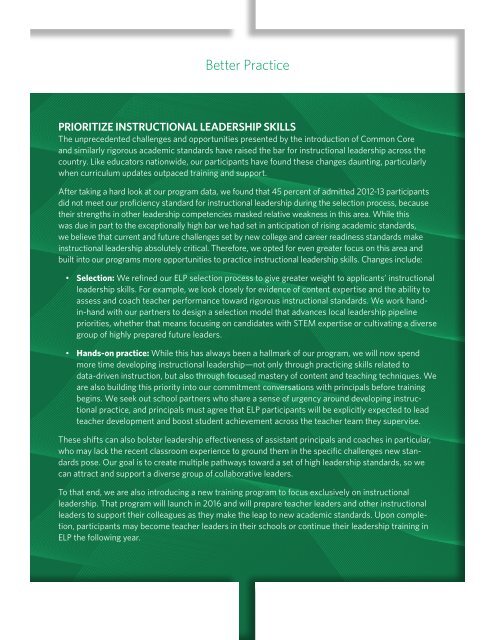Better PracticePRIORITIZE INSTRUCTIONAL LEADERSHIP SKILLSThe unprecedented challenges and opportunities presented by the introduction of Common Coreand similarly rigorous academic standards have raised the bar for instructional leadership across thecountry. Like educators nationwide, our participants have found these changes daunting, particularlywhen curriculum updates outpaced training and support.After taking a hard look at our program data, we found that 45 percent of admitted 2012-13 participantsdid not meet our proficiency standard for instructional leadership during the selection process, becausetheir strengths in other leadership competencies masked relative weakness in this area. While thiswas due in part to the exceptionally high bar we had set in anticipation of rising academic standards,we believe that current and future challenges set by new college and career readiness standards makeinstructional leadership absolutely critical. Therefore, we opted for even greater focus on this area andbuilt into our programs more opportunities to practice instructional leadership skills. Changes include:• Selection: We refined our ELP selection process to give greater weight to applicants’ instructionalleadership skills. For example, we look closely for evidence of content expertise and the ability toassess and coach teacher performance toward rigorous instructional standards. We work handin-handwith our partners to design a selection model that advances local leadership pipelinepriorities, whether that means focusing on candidates with STEM expertise or cultivating a diversegroup of highly prepared future leaders.• Hands-on practice: While this has always been a hallmark of our program, we will now spendmore time developing instructional leadership—not only through practicing skills related todata-driven instruction, but also through focused mastery of content and teaching techniques. Weare also building this priority into our commitment conversations with principals before trainingbegins. We seek out school partners who share a sense of urgency around developing instructionalpractice, and principals must agree that ELP participants will be explicitly expected to leadteacher development and boost student achievement across the teacher team they supervise.These shifts can also bolster leadership effectiveness of assistant principals and coaches in particular,who may lack the recent classroom experience to ground them in the specific challenges new standardspose. Our goal is to create multiple pathways toward a set of high leadership standards, so wecan attract and support a diverse group of collaborative leaders.To that end, we are also introducing a new training program to focus exclusively on instructionalleadership. That program will launch in 2016 and will prepare teacher leaders and other instructionalleaders to support their colleagues as they make the leap to new academic standards. Upon completion,participants may become teacher leaders in their schools or continue their leadership training inELP the following year.
“It’s different from going and sitting in PD that you get that one time,and then there’s no one checking back to see if you need help. Youget support, which you wouldn’t get in an in-service for one day.”ELP Participant and Teacher Leader, New OrleansTraining focuses on 11 component skills, which are introduced monthly:• Reflective Practice and Continuous Improvement• Communication, Cultural Competence and InterpersonalRelationships• Learning and Teaching—Pedagogy and Instructional Strategies• Learning and Teaching—Data-Driven Instruction• Vision and Mission• Diagnostic and Strategic Planning• Operational Systems and Structures Aligned to Vision and Mission• Urgency around Improving Students’ Academic Performance• Professional Development• Leadership Development• Performance ManagementFor each skill, ELP participants complete self-guided webinars, followedby in-person practice sessions with ELP directors and peers. Then,they practice the skills on the job and share their experiences with thegroup for reflection and feedback. Each learning cycle follows a six-stepprocess, as with our principal programs (Figure 6).ELP coursework is focused on real-life practice, as well. Rather thanreading about leadership, participants practice leadership skills atschool, applying these skills to improve instructional practice acrossteams of teachers and learning to win adult buy-in for their initiatives,both of which are critical skills for effective leadership.They film their teacher meetings and coaching sessions, and thenshare and study those videos during meetings with their directorsand in ELP group meetings so they can observe their practicealongside their peers and see exactly where they are succeedingand where they need to improve. Through this cycle of feedbackand reflection, participants master specific techniques that lead tochanges in adult behavior, such as creating a shared sense of urgencyaround improving student learning.Assessment is based on four such assignments, along with three oneon-onemeetings with a New Leaders director to track progress towardgoals for student growth. Throughout all the assignments, participantssubmit written reflections on their ability to lead data-driven instruction,apply beliefs about student potential to achieve positive resultsand succeed at accelerating student achievement.This structure provides ample opportunity for participants to practicewhat they’re learning in real school settings, while applying feedbackfrom a supportive director and peers as they master the leadershipskills that advance school improvement.Training Example:Learning to CoachEffective coaching is animportant skill in a teacherleader’s toolkit. Here’s howparticipants in the ELP programlearn, practice and master it.Webinar: Walk through a selfguidedwebinar to gain an overviewof the appropriate balance of inquiryversus advocacy approacheswhen coaching other teachers.Guided Practice with Peers:During an ELP cohort meeting,discuss strengths of variouscoaching methods, role-playwith peers and share feedbackon videos showing coachingpractice by peers at school.Deep Practice and Reflection:Apply various coachingapproaches on the job at school.Videotape these interactionsfor reflection and feedback.Feedback and Reflection: Sharevideo during the next in-person ELPsession, and discuss reflection andfeedback with peers and coach.Repeated Practice and Reflection:Apply feedback from the initialvideo to additional coachingsessions at school with teacherteam. Videotape these interactionsfor further reflection and feedback.Repeat this step as needed.Assessment: Formally submit avideo of an at-school coachingsession with a written reflectionfor measurement againstprogram proficiency standards.UNTAPPED | 19


